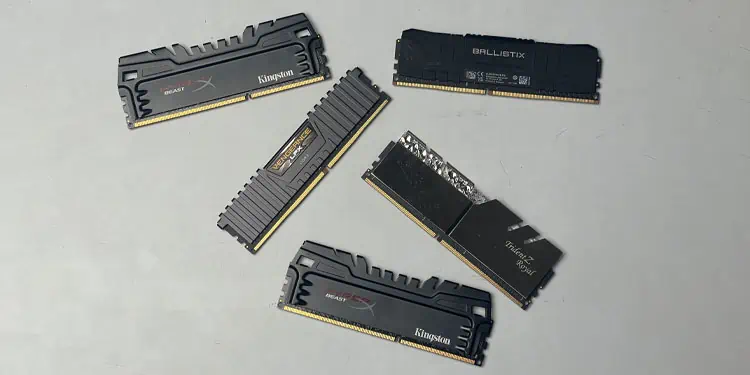The most crucial component in a RAM is its memory IC chip, which is responsible for storing and retrieving data. As long as you choose a RAM brand that uses memory IC chips from reputed companies, you should be alright.
As of now, only these three companies dominate the memory IC chip market: Samsung, SK Hynix, and Micron. Most, if not all, RAM manufacturers like Corsair, G. Skill, Kingston, Trident, Crucial, etc., use memory IC chips from these three companies.
Using RAM from top brands, you will have the upper hand on things like heatsink designs, RGB support, warranty, return policy, and availability. But in some aspects, like cost, the lesser-known brands would be better.
Having used and intensively tested several RAMs from numerous brands, Here is what I’ve found.
RAM Brands Doesn’t Matter (In Most Cases)
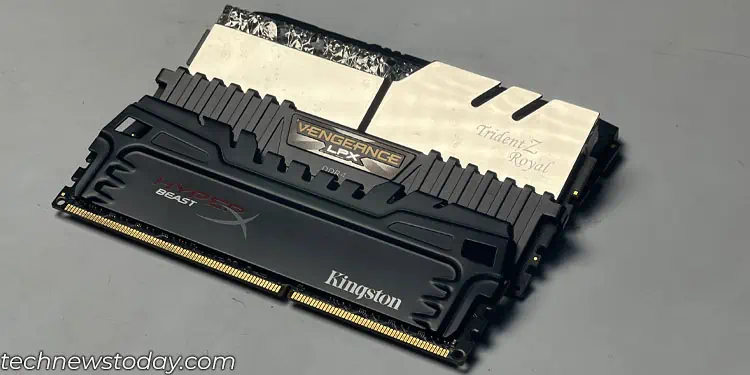
When choosing a RAM, the most important thing to keep in mind is its frequency and CAS Latency. Then only comes the brand. For DDR4 RAM, a speed of 3200 or 3600 with latency CL 16/18 is considered on par. Meanwhile, for DDR5, a RAM stick of 5000/6000 MHz with CL 36/40 will do the job for you.
What actually matters is the numerous memory chips that are soldered into the memory stick. Unfortunately, the specification does not list the kind of memory chip a module is equipped with. This is where choosing a reputed brand comes in.
All reputed brands use memory chips from the three big companies. Good memory modules that have a high retail value will likely have a good die (memory chip) that runs on a higher frequency with lower CAS latency.
Some die also pair well with a certain CPU. This is exactly the case with the Samsung B-die working well with the Zen 3 Ryzen processor.
But Why Choose Reputed RAM Brands?
You may think, if most RAM in the market uses the same memory IC chip, why are popular brands so expensive? Well, here are a few reasons why popular RAM brands like Corsair, G. Skill, Kingston, etc., cost so much more.
Performs Intensive Testing
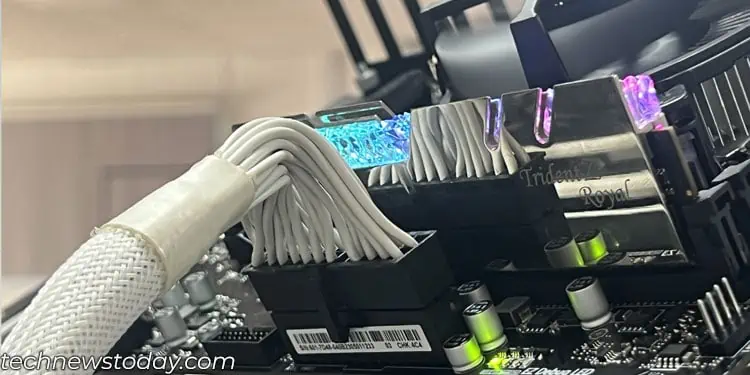
There is a reason why some RAM manufacturers are more reputed than others. One reason is RAM testing and quality assurance.
Even if the memory chips are manufactured by the same companies, the reliability of how well the entire module performs on stress depends on the RAM brands.
Choosing RAM from a reputed brand means these RAMs go through intense stress tests, making sure that they do not crash or run into memory problems in the future. It also means that the module handles stress workloads much more efficiently without crashes.
From personal experience, RAM from known brands like Corsair or G. Skill ran into significantly fewer issues when increasing frequency and lowering latency compared to less known brands.
Provides Good Warranty and Return policy
Another aspect that popular RAM brands dominate is warranty and return policies.
There is always a chance that PC components run into memory errors. In the case of RAM, complications could be errors in the internal circuitry or the memory chips.
Getting RAM from a reputed brand means they have great return policies and provide a good warranty if the module runs into errors.
Some brands may even give a lifetime warranty on memory modules. You may not always find this type of support in lesser-known RAM brands.
Efficient Heat Sink Designs and Overclock Capability
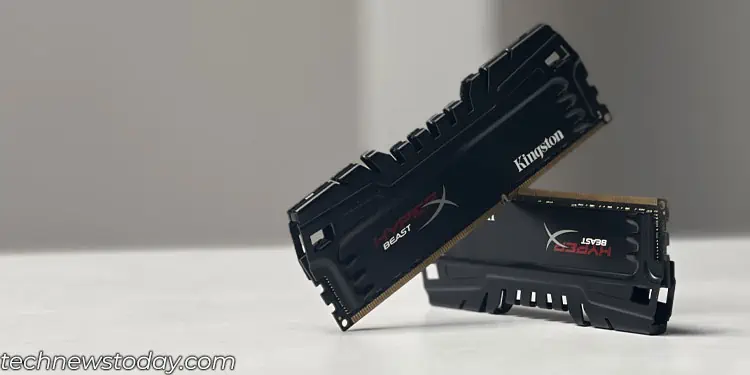
If you are looking to overclock your RAM, the heatsink (along with case airflow) plays a crucial role in cooling it down. RAM Heatsink from companies like G. Skill, Corsair, Crucial, etc. are designed really well and effectively cools down the memory chips.
Although it is the die (memory IC chip) that is responsible for how much overclock it can handle, the heatsink helps the memory chip achieve stability at higher frequency as it prevents thermal throttling.
Heatsinks on memory modules from unknown or less-known brands may not provide efficient cooling. In such cases, the memory module will run into frequent system crashes and memory errors when overclocking.
Availability
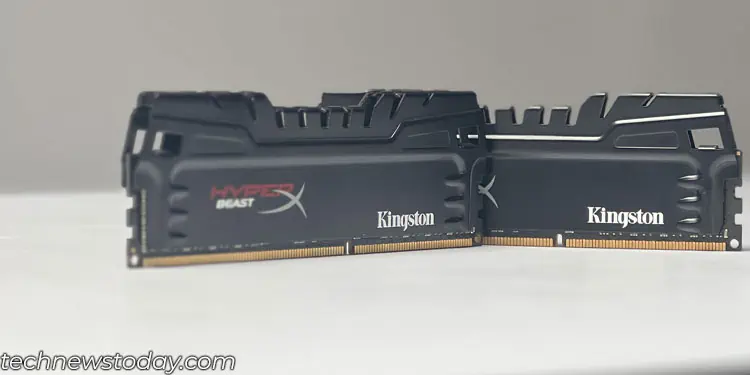
Choosing RAM from brands that sell world wide means they probably manufacture hundreds and thousands of the same memory kits every year. This means availability for future upgrades.
Say you buy a Corsair’s Vengeance DDR5 16 (2×8) GB 5600 MT/s CL36 memory kit. In the future, if you want to upgrade to 32 GB, you can buy another identical memory kit of 16 (2×8) GB and the system will work fine without any issues.
However, if you go with a RAM brand that is not popular, the chances of finding the RAM with similar capacity, frequency, latency, and rank could be hard.
What RAM Brand Should You Choose?
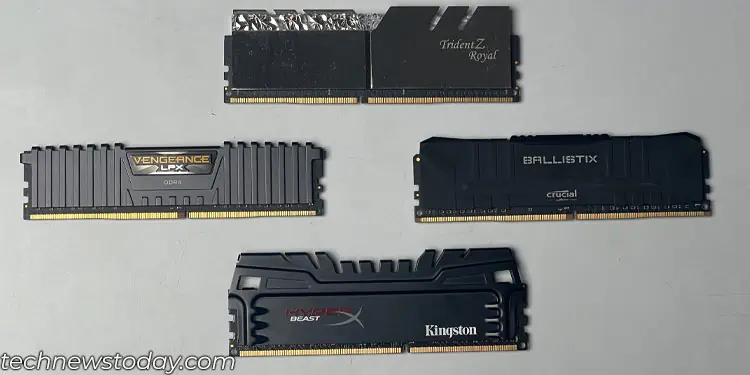
If you are installing a completely new set of RAM to your setup, you can choose any RAM brand like Kingston, Crucial, Corsair, Corsair, or G. Skill. These RAM are fairly popular and will also provide you good transfer rates with lower CAS Latency with options for future upgrades as well.
When selecting RAM, it is also a good idea to check the type of die (memory chip) it uses. Currently, Samsung B-die and Micron E-die are popular. These memory chips offer the best frequency-to-latency ratio and have a good reputation for stability when overclocking.
Unfortunately, your RAM specification does not mention the type of die it uses. You can go to the B-Die Finder website to check the memory module if it uses a Samsung B-Die.
If you are looking to upgrade your RAM, I recommend that you get identical to the ones you previously installed. This means the same brand, frequency, timings, and memory ranks. Mixing RAM with different frequency and memory timings means the RAM will not run at its full speed.
By doing this, all your RAM will run on similar frequency and memory timings, thus lowering the chance of memory failure.
This may not be possible if you cannot find the exact memory module. In such cases, try looking for RAM with similar RAM frequency, latency, and memory ranks. But, whether the system will function without any memory errors is uncertain.

